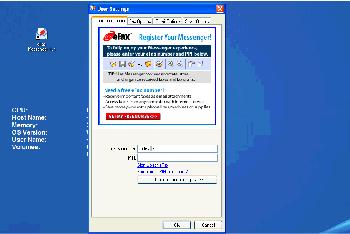

- #Efax messenger 4.4 download upgrade#
- #Efax messenger 4.4 download code#
- #Efax messenger 4.4 download plus#
The specific flaw exists within the Parallels Service.
#Efax messenger 4.4 download code#
An attacker must first obtain the ability to execute low-privileged code on the target host system in order to exploit this vulnerability. This vulnerability allows local attackers to escalate privileges on affected installations of Parallels Access 6.5.4 (39316) Agent. An attacker can leverage this vulnerability to escalate privileges and execute arbitrary code in the context of SYSTEM. The service loads Qt plugins from an unsecured location. The specific flaw exists within the Desktop Control Agent service.

An attacker must first obtain the ability to execute low-privileged code on the target system in order to exploit this vulnerability. A local area network attacker with general user privilege can exploit this vulnerability to execute arbitrary code, manipulate system command or disrupt service. The NHI card’s web service component has a stack-based buffer overflow vulnerability due to insufficient validation for network packet header length. An attacker can leverage this vulnerability to escalate privileges and execute arbitrary code in the context of the hypervisor. The issue results from the lack of proper validation of the length of user-supplied data prior to copying it to a stack-based buffer. The specific flaw exists within the e1000 virtual device. An attacker must first obtain the ability to execute high-privileged code on the target guest system in order to exploit this vulnerability. This vulnerability allows local attackers to escalate privileges on affected installations of xhyve. This is better than `eval` for the following reasons: - Arbitrary code should not be able to execute immediately, since the `Function` constructor explicitly *only creates* anonymous functions - Functions are created without local closures, so they only have access to the global scope If you use: - **Version `=3.0.0`**, `allowFunctionEvaluation` is already set to `false` by default, so no further steps are necessary. In v2.2.2, we switched from using `eval` to using () to construct anonymous functions.
#Efax messenger 4.4 download upgrade#
This prop will be set to `true` in v2.2.2, which allows upgrade without losing backwards-compatibility.

Prop is added to `JsonTree` called `allowFunctionEvaluation`. This vulnerability exists in the default `onSubmitValueParser` prop which calls (). One important note is that users who have defined a custom () callback prop on the () component should be ***unaffected***. Given that this component may often be used to display data from arbitrary, untrusted sources, this is extremely dangerous. This unfortunately could allow arbitrary code to be executed if it exists as a value within the JSON structure being displayed. To do this, Javascript's () function is used to execute strings that begin with "function" as Javascript. This library allows strings to be parsed as functions and stored as a specialized component, (). This will stop arbitrary file uploads, but the only way to stop attackers from registering accounts is by updating to the latest build. As a workaround, set `JWT_SECRET` environment variable to a long random string. To be affected, ALL of the following must be true: Self-hosted deployment (GrowthBook Cloud is unaffected) using local file uploads (as opposed to S3 or Google Cloud Storage) NODE_ENV set to a non-production value and JWT_SECRET set to an easily guessable string like `dev`. If the attacker uploads a Python script to the right location, they can execute arbitrary code within the container. With some self-hosted configurations in versions prior to, attackers can register new accounts and upload files to arbitrary directories within the container. GrowthBook is an open-source platform for feature flagging and A/B testing. In JetBrains IntelliJ IDEA before 2022.2 local code execution via a Vagrant executable was possible This could result in the user gaining elevated permissions and being able to execute arbitrary code due to lack of an integrity check of the configuration file.
#Efax messenger 4.4 download plus#
Weak permissions on the configuration file in the PAM module in Grommunio Gromox 0.5 through 1.x before 1.28 allow a local unprivileged user in the gromox group to have the PAM stack execute arbitrary code upon loading the Gromox PAM module.Īn improper privilege management vulnerability in McAfee Security Scan Plus (MSS+) before 4.1.262.1 could allow a local user to modify a configuration file and perform a LOLBin (Living off the land) attack. In JetBrains Rider before 2022.2 Trust and Open Project dialog could be bypassed, leading to local code execution


 0 kommentar(er)
0 kommentar(er)
